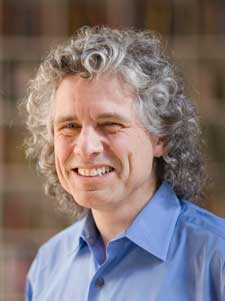Hello,
In 2007, the annual lecture in memory of my sister Azra's late husband, Harvey David Preisler, was delivered by Medicine Nobel laureate Craig Mello. I wrote about that lecture here.
In 2008, Richard Dawkins was the invited guest. I interviewed him here.
This year, the lecture will be delivered by Steven Pinker.
The Eighth
HARVEY PREISLER
Memorial Symposium
Saturday, May 8, 2010
9:00 a.m. to 12:00 p.m.
New York Academy of Sciences
250 Greenwich Street, 40th Floor, New York, NY 10007
RSVP: Dr. Azra Raza
[email protected]
9:00 a.m: Reception/Breakfast
9:30 a.m: Welcome of the honored guests and Tribute to Harvey Preisler by Sheherzad Raza Preisler
9:45 a.m: Introduction of Dr. Steven Pinker by Azra Raza
10:00 a.m: Dr. Steven Pinker
Title of Lecture: Language as a Window into Human Nature
 Dr. Steven Pinker is Harvard College Professor and Johnstone Family Professor in the Department of Psychology at Harvard University. Until 2003, he taught in the Department of Brain and Cognitive Sciences at MIT. He conducts research on language and cognition, writes for publications such as the New York Times, Time, and The New Republic, and is the author of seven books, including The Language Instinct, How the Mind Works, Words and Rules, The Blank Slate, and most recently, The Stuff of Thought: Language as a Window into Human Nature. Pinker is the Chair of the Usage Panel of The American Heritage Dictionary and has served as editor or advisor for numerous scientific, scholarly, media, and humanist organizations, including the American Association the Advancement of Science, the National Science Foundation, the American Academyof Arts and Sciences, the American Psychological Association, and the Linguistics Society of America. He has won many prizes for his books (including the William James Book Prize three times, the Los Angeles Times Science Book Prize, and the Eleanor Maccoby Book Prize), his research (including the Troland Research Prize from the National Academy of Sciences, the Early Career Award from the American Psychological Association, and the Henry Dale Prize from the Royal Institution of Great Britain), and his graduate and undergraduate teaching. He is also a Humanist Laureate, the 2006 Humanist of the Year, recipient of the 2008 Innovations for Humanity Award from La Ciudad de las Ideas in Mexico, the 2008 Honorary President of the Canadian Psychological Association, and the recipient of six honorary doctorates. Pinker lives in Boston and in Truro with Rebecca Newberger Goldstein. The other authors in the family are his sister Susan Pinker and Rebecca’s daughter Yael Goldstein.
Dr. Steven Pinker is Harvard College Professor and Johnstone Family Professor in the Department of Psychology at Harvard University. Until 2003, he taught in the Department of Brain and Cognitive Sciences at MIT. He conducts research on language and cognition, writes for publications such as the New York Times, Time, and The New Republic, and is the author of seven books, including The Language Instinct, How the Mind Works, Words and Rules, The Blank Slate, and most recently, The Stuff of Thought: Language as a Window into Human Nature. Pinker is the Chair of the Usage Panel of The American Heritage Dictionary and has served as editor or advisor for numerous scientific, scholarly, media, and humanist organizations, including the American Association the Advancement of Science, the National Science Foundation, the American Academyof Arts and Sciences, the American Psychological Association, and the Linguistics Society of America. He has won many prizes for his books (including the William James Book Prize three times, the Los Angeles Times Science Book Prize, and the Eleanor Maccoby Book Prize), his research (including the Troland Research Prize from the National Academy of Sciences, the Early Career Award from the American Psychological Association, and the Henry Dale Prize from the Royal Institution of Great Britain), and his graduate and undergraduate teaching. He is also a Humanist Laureate, the 2006 Humanist of the Year, recipient of the 2008 Innovations for Humanity Award from La Ciudad de las Ideas in Mexico, the 2008 Honorary President of the Canadian Psychological Association, and the recipient of six honorary doctorates. Pinker lives in Boston and in Truro with Rebecca Newberger Goldstein. The other authors in the family are his sister Susan Pinker and Rebecca’s daughter Yael Goldstein.
Professor Pinker will make himself available for a question/answer period afterward. If you are in the New York City area (or can be on Saturday), I urge you to attend.
RSVP in the comments section to me to be put on a complimentary list, courtesy of my sister. Please note that only the first 50 responders will be able to attend.
Yours,
Abbas
